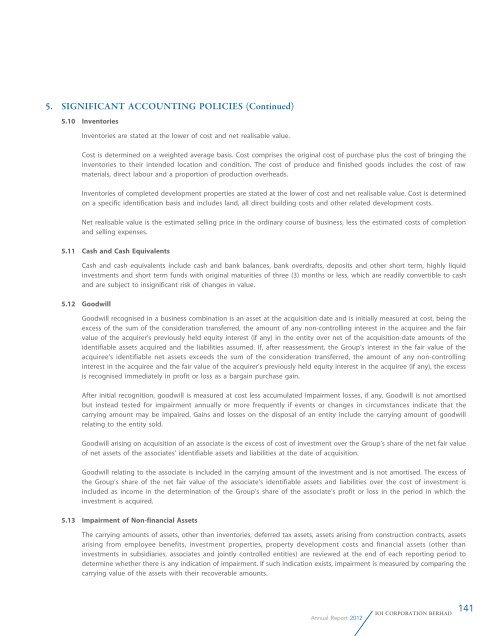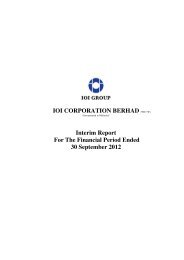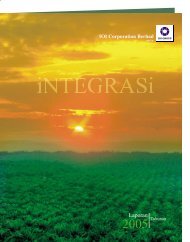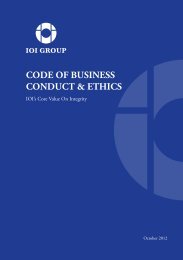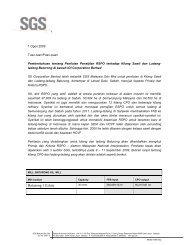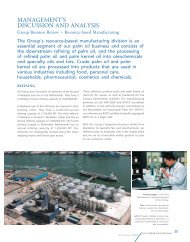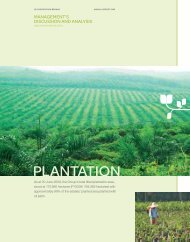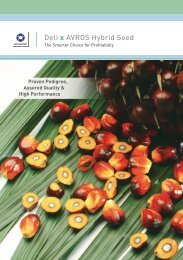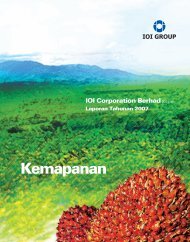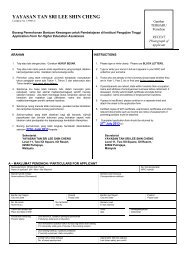Annual Report 2012 - IOI Group
Annual Report 2012 - IOI Group
Annual Report 2012 - IOI Group
Create successful ePaper yourself
Turn your PDF publications into a flip-book with our unique Google optimized e-Paper software.
5. SIGNIFICANT ACCOUNTING POLICIES (Continued)5.10 InventoriesInventories are stated at the lower of cost and net realisable value.Cost is determined on a weighted average basis. Cost comprises the original cost of purchase plus the cost of bringing theinventories to their intended location and condition. The cost of produce and finished goods includes the cost of rawmaterials, direct labour and a proportion of production overheads.Inventories of completed development properties are stated at the lower of cost and net realisable value. Cost is determinedon a specific identification basis and includes land, all direct building costs and other related development costs.Net realisable value is the estimated selling price in the ordinary course of business, less the estimated costs of completionand selling expenses.5.11 Cash and Cash EquivalentsCash and cash equivalents include cash and bank balances, bank overdrafts, deposits and other short term, highly liquidinvestments and short term funds with original maturities of three (3) months or less, which are readily convertible to cashand are subject to insignificant risk of changes in value.5.12 GoodwillGoodwill recognised in a business combination is an asset at the acquisition date and is initially measured at cost, being theexcess of the sum of the consideration transferred, the amount of any non-controlling interest in the acquiree and the fairvalue of the acquirer’s previously held equity interest (if any) in the entity over net of the acquisition-date amounts of theidentifiable assets acquired and the liabilities assumed. If, after reassessment, the <strong>Group</strong>’s interest in the fair value of theacquiree’s identifiable net assets exceeds the sum of the consideration transferred, the amount of any non-controllinginterest in the acquiree and the fair value of the acquirer’s previously held equity interest in the acquiree (if any), the excessis recognised immediately in profit or loss as a bargain purchase gain.After initial recognition, goodwill is measured at cost less accumulated impairment losses, if any. Goodwill is not amortisedbut instead tested for impairment annually or more frequently if events or changes in circumstances indicate that thecarrying amount may be impaired. Gains and losses on the disposal of an entity include the carrying amount of goodwillrelating to the entity sold.Goodwill arising on acquisition of an associate is the excess of cost of investment over the <strong>Group</strong>’s share of the net fair valueof net assets of the associates’ identifiable assets and liabilities at the date of acquisition.Goodwill relating to the associate is included in the carrying amount of the investment and is not amortised. The excess ofthe <strong>Group</strong>’s share of the net fair value of the associate’s identifiable assets and liabilities over the cost of investment isincluded as income in the determination of the <strong>Group</strong>’s share of the associate’s profit or loss in the period in which theinvestment is acquired.5.13 Impairment of Non-financial AssetsThe carrying amounts of assets, other than inventories, deferred tax assets, assets arising from construction contracts, assetsarising from employee benefits, investment properties, property development costs and financial assets (other thaninvestments in subsidiaries, associates and jointly controlled entities) are reviewed at the end of each reporting period todetermine whether there is any indication of impairment. If such indication exists, impairment is measured by comparing thecarrying value of the assets with their recoverable amounts.<strong>Annual</strong> <strong>Report</strong> <strong>2012</strong><strong>IOI</strong> CORPORATION BERHAD 141


